Τhe Greek Open Schooling Network in action
From October to December 2025, the Greek Open Schooling Network (OSN) entered an active phase through a series of online meetings that brought together a...


On November 3, the Finnish research team of the FEDORAS Teacher Academy organized a second local Open Schooling network meeting for science teachers on Zoom. While our first local network meeting in September introduced the theoretical background of our collaboration, this meeting focused on the local needs, interests, and expertise of the teachers in our shared community of inquiry.
At the meeting, we began by identifying some of the topics science teachers expect to cover this school year. Our goal was to inspire the idea of connecting the FEDORAS collaboration to daily teaching. This would change the perspective from starting over with completely new ideas to co-developing and critically reflecting on things that are already part of our common school practice. In our view, teachers have many opportunities for interdisciplinarity, future perspectives, and creativity, if we collectively learn to notice these opportunities in our daily teaching. After the activity, Sara Komulainen, a member of our research team, gave a short presentation on creating long-lasting change by reimagining the old, even though we cannot change the whole system at once. Our discussion continued with an open conversation where teachers shared their initial thoughts on how they could expand their existing teaching to more widely cover epistemic, socio-relational and institutional dimensions.
During the meeting, we observed how Finnish science teachers include various elements of interdisciplinarity, and creativity, especially in the sustainability education. Some shared ongoing study units available to all students, while others shared co-designed courses implemented with partner schools. Some suggested school-wide thematic days to shake up students’ perspectives and break their usual routines and ways of reasoning. At the same time, teachers raised concerns about the lack of hope and a meaningful assessment culture to create value for these initial efforts.
Finally, we assigned a task to our science teachers. They were asked to choose one element or issue from their teaching or work that we could explore and reflect on together using FEDORAS’ research-based frameworks and materials.
We look forward to hearing about the cases that our shared community brings to us. In the FEDORAS network, we have a unique opportunity to reflect on how to build on the great work that teachers have already started in their school communities and create meaningful relevance and hope for collective work.
…
From October to December 2025, the Greek Open Schooling Network (OSN) entered an active phase through a series of online meetings that brought together a...

On October 23 and 24, the University of Girona hosted a key milestone in the FEDORAS Teacher Academy. FEDORAS partners from the different European institutions,...

November 2025 The FEDORAS Academy project FEDORAS is a new European Teacher Academy that seeks to create open and collaborative spaces where researchers, teachers, and...

A FEDORAS event as a practice of cultural transformation in education On November 6th, in the Prodi Hall of the San Giovanni in Monte complex...
